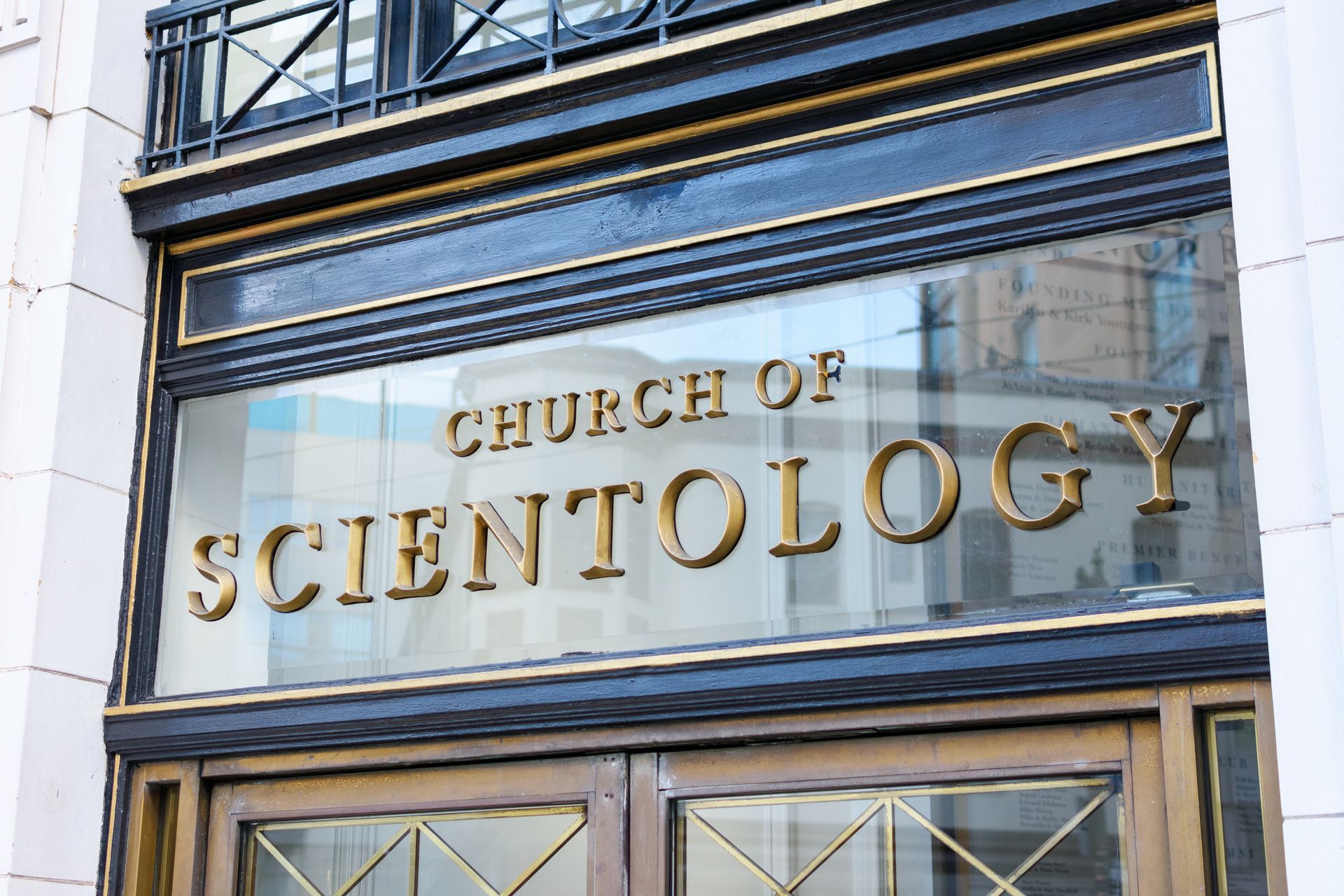- The Drop In by DoubleBlind
- Posts
- The Church of Scientology Obviously Took Notes from Nancy Reagan
The Church of Scientology Obviously Took Notes from Nancy Reagan
Are you surprised? PLUS the history of Albino Penis Envy, LSD gel tabs, and the right ketamine dosage.

POWERED BY
Good morning and welcome to another edition of The Drop In! We're kicking things off with a story about the Church of Scientology’s recent take on psychedelics.
Here's the tea: The story was published by a watchdog organization closely related to the Church of Scientology, and it completely shits on psychedelic therapy for veterans. We’re aware that psychedelics aren’t for everyone — even vets. But the Church’s take reads like it could have been written by Nancy Reagan. It lacks all nuance. It’s boring and predictable. And yet, a fascinating peek into the propaganda machine behind sanctioned religious cults in the U.S. 😉
If you keep scrolling you’ll find stories about Penis Envy mushrooms (duh!), ketamine dosages, DMT tips, and what you need to know about acid gel tabs.
Let's drop in on this, and much more, below.
Enjoy the ride 🖖
Mary Carreón
Editor-in-Chief
Together With Superpower
Everybody has a 100-year potential.
Your body's been trying to talk to you. Brain fog. Low energy. Feeling off. These aren't random - they're signals.
Superpower decodes the signals:
100+ blood biomarkers tested annually
Data tracked over your lifetime
24/7 access to a human medical team
A custom action plan that tells you exactly what to do to feel healthier
Whether you’re optimizing or overwhelmed, Superpower shows you what's really going on inside your body (and then tells you what to do about it).
$499. Two lab tests per year. 100+ biomarkers. No hidden fees.
Featured

The Church of Scientology Dusts Off Reagan-Era Rhetoric in Statement Against Psychedelic Therapy for Veterans
A Church-affiliated group warns that legalizing therapy for veterans could revive Cold War mind control.
In a scathing critique cloaked as concern for the health and well-being of veterans, the Citizens Commission on Human Rights (CCHR) — a watchdog group founded by members of the Church of Scientology that’s sometimes described as a “front group” for the church — has denounced federal efforts to legalize psychedelics for veterans, calling it dangerous, exploitative, and reminiscent of Cold War-era mind control. (Sensational much?)
But while the group accuses psychedelic medicine proponents of reviving “a shameful legacy of unethical experimentation,” their rhetoric raises another question: Why is the Church of Scientology and its watchdog mouthpiece against psychedelics in the first place?
CCHR’s OpEd contends that the new legislation fast-tracking psychedelic therapies could “turn vets into test subjects for a projected $10 billion profit bonanza.” The group cites grim historical anecdotes — like the CIA’s infamous MK-Ultra program and Operation Delirium at Edgewood Arsenal — as proof that psychedelics and psychiatry are a nefarious pairing.
The story completely disregards the growing body of scientific literature showing that, when administered in controlled settings, psychedelics like MDMA and psilocybin can help certain individuals treat PTSD, depression, and substance use disorders, all of which are ailments that disproportionately impact veterans. Dozens of peer-reviewed studies, including a number of Phase 3 trials, which, not for nothing, show significant and sometimes life-saving improvements for vets.
The CCHR, however, insists these substances only serve to “mask” trauma, rather than heal it. They warn that such therapies are “a betrayal” of veterans’ trust and provide a litany of worst-case scenarios — anecdotes of bad trips, panic, psychosis, and even murder linked to psychedelic use. “Real-world studies show psychedelics can do more harm than good,” the group writes.
Most of the evidence CCHR cites comes from recreational or unguided use; settings that lack the therapeutic container now considered the gold standard in clinical research. But the bills on Capitol Hill authorize psychedelic-assisted therapy, not unsupervised partying, so CCHR’s horror-story comparisons are largely beside the point.
Back to the question we proposed earlier: Why is this watchdog — which, again, is basically the PR arm of Scientology — so vehemently opposed to a movement that many scientists say could revolutionize mental health care?
While CCHR doesn't disclose its theological affiliations in the article, the group was co-founded by the Church of Scientology in 1969 and shares its deep antagonism toward psychiatry. Scientology doctrine positions psychiatry as a malevolent force, responsible for everything from global conflict to personal misery. The church has long crusaded against psychiatric medication, electroshock therapy, and diagnostic labels.
Given that psychedelics are increasingly being explored through psychiatric frameworks, their emergence as therapeutic tools may threaten the core of Scientology’s anti-psychiatric worldview. Is the opposition philosophical? Strategic? Theologically motivated? It’s impossible to say with certainty, but the intensity of the pushback suggests the resistance may go beyond concern for veterans.
Ultimately, CCHR’s alarmist framing, while not devoid of cautionary value (psychedelics really aren’t for everyone), fails to grapple with the nuance of the current psychedelic movement. Yes, there are risks. There’s also a troubling history! But, there’s also progress that’s real, measurable, and for many people, life-changing.
And for veterans in the grip of PTSD, the question may not be whether psychedelics are risk-free, but whether we owe them access to every possible tool for healing, particularly those backed by science and administered with care.
So why is the Church of Scientology so afraid of that possibility? Lol. Your guess is as good as ours.

Sneak Peek
On the Road with The Grateful Dead
This Friday, we’re stepping into the swirling, tie-dyed world of the Dead & Company tour ahead of their Golden Gate Park shows in San Francisco, where freedom and absurdity collide in a cross-country kaleidoscope of grilled cheese, nitrous oxide, and existential longing.
Our story follows one young woman’s transformation from curious observer to full-on tourhead—riding in vans, dodging cops, selling bootlegs, and questioning what it means to be truly free. It’s a tale of music, myth, and the blurry boundary between rebellion and routine.
Upgrade your subscription to get it in your inbox Friday morning!
& More Must-Reads
👅 Acid gel tabs tend to last longer than paper tabs, both in terms of their shelf life and in terms of how long they stay in the body. Read more here.
🍄 Albino Penis Envy mushrooms didn’t just appear—they were engineered in a jar by a curious mycologist chasing aesthetics, not potency. Nearly 20 years later, his freaky white creation is one of the most sought-after (and misunderstood) strains in psychedelic history. Read more here.
☕ Coffee’s not the only way to get energized. These caffeine alternatives deliver a boost without the crash. Whether you’re caffeine-sensitive or just want to feel more grounded, here are five feel-good options that keep you alert and balanced. Read more here.
🌿 Whether you smoke it, sip it in ayahuasca, or vape it on your couch, DMT offers one of the most intense and ineffable trips in the psychedelic universe. Here’s how each method stacks up—and what to expect when you blast off. Read more here.
⚪ Ketamine can be a lifesaving treatment—or a dangerous ride—depending on how much you take and how you take it. From K-sprays to K-holes, here’s everything you need to know about safe dosing across every method of consumption. Read more here.

DoubleBlind Digs
In New York City? Visit DoubleBlind’s Creative Director, David Good’s, exhibit at Pratt Manhattan Gallery, where he gives a peek behind his creative practice in the formation of DoubleBlind’s visual identity! Learn more here.
In Santa Fe this September? Join Limina Foundation for The Enchanted State, a landmark day-long gathering exploring New Mexico’s psychedelic legacy—featuring Andrew Weil, Doña Eugenia Pineda Casimaro, Kyrsten Sinema, and more. General and VIP tickets are available now. Learn more here.
Together With Superpower
There’s more to health than “normal”.
You know your baseline. And you know when something’s off. Superpower helps you tune in before things go sideways.
100+ lab tests
Results tracked over your lifetime
24/7 access to a medical team
Superpower keeps you calibrated.
Two tests a year. $499. No hidden fees. Health on your frequency.

Around the Web
An Indigenous-led advisory group is urging Colorado to halt its psilocybin therapy rollout, warning of cultural harm, commercialization, and a lack of safeguards for sacred medicines. Read more from Westword.
Czech Republic’s president has signed a landmark bill legalizing home cannabis cultivation and allowing psilocybin for medical use, with reforms set to take effect in 2026. Read more from Marijuana Moment.
National parks may look pristinely psychedelic this summer, but insiders warn they're being hollowed out — staff cuts, hiring freezes, and lost scientific monitoring threaten the very purpose of the Park Service. Read more from High Country News.
CBP officers in Philadelphia intercepted over 12 pounds of psilocybin-infused gummies, chocolates, and capsules en route to Spain, marking the latest federal crackdown on psychedelic exports. Read more from the U.S. Customs and Border Protection.
Psilocybin may do more than shift your perspective—it might also help you live longer. A new Emory University study found that the psychedelic compound extended lifespan and reversed signs of aging in mice. Read more from the Independent.
How was today's Drop In? |
💌 If you loved this email, forward it to a psychonaut in your life.



Reply